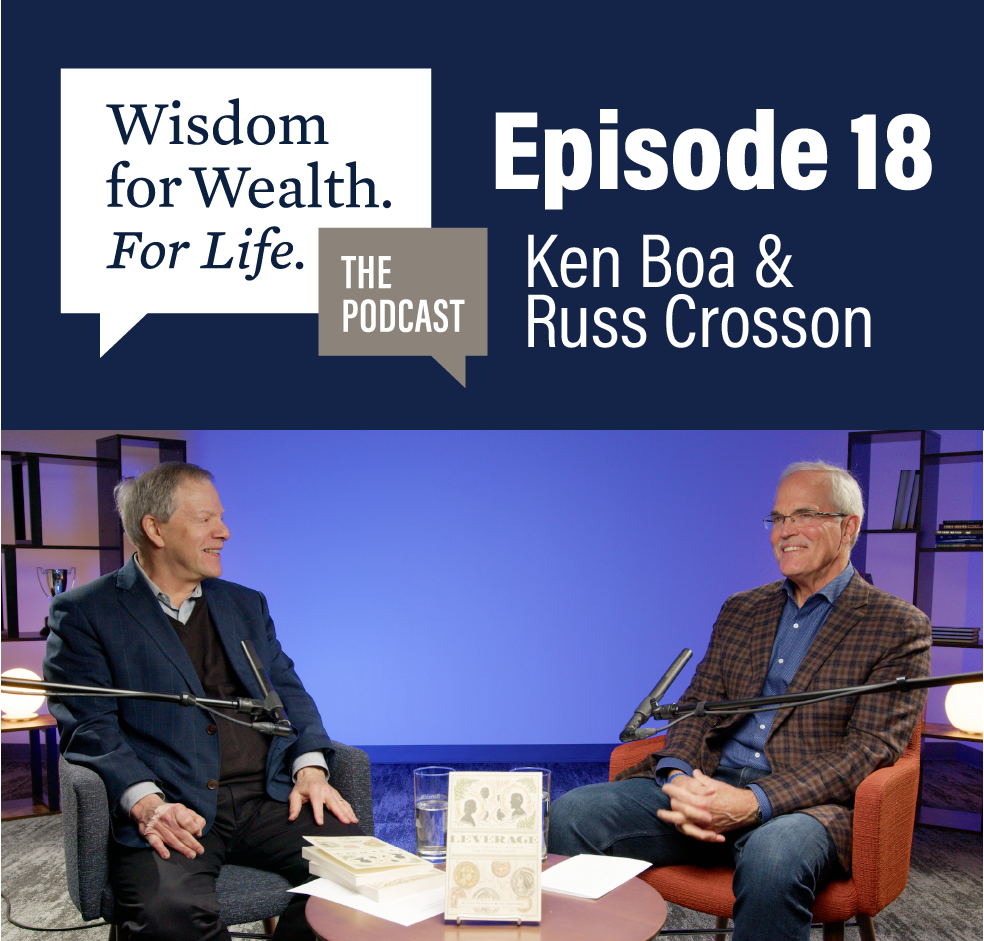“Wisdom for Wealth. For Life.” Episode 18: How to Leverage Wealth for Eternal Gain
Note: This article contains excerpts from chapters of Leverage: Using Temporal Wealth for Eternal Gain (Kenneth Boa and Russ Crosson, Trinity House Publishers, 2022). It may only be reproduced by permission of the publisher.
The book is available to purchase from http://trinityhousepublishers.org/ store and Amazon.com.
It’s often said that our calendars and checkbooks (or, these days, our mobile banking records) reveal our true priorities. We may say we’re seeking God’s kingdom first, but do our daily routines—including how we spend our time and money—back up our claim?
As we study Scripture, we are reminded that everything we own belongs to God, and He provides the resources we have (whether we consider them to be little or much) to meet our needs (Philippians 4:19). He also desires for us to be wise stewards of what He entrusted to us by investing in things that have an eternal impact, rather than using our wealth for personal benefit alone.
The Metaphor of a Lever
A lever is a simple machine that increases efficiency by amplifying a small force and turning it into a much larger one, which opens up a realm of mechanical possibilities. As the Greek mathematician Archimedes famously said, “Give me a lever long enough and a fulcrum on which to place it, and I shall move the world.”
While Archimedes’s scope focused solely on the material and the finite, the book Leverage applies this scientific principle to matters of infinite importance—generosity and accountability.
Whether or not we realize it, we use the principle of leverage on a daily basis as we turn limited resources into an advantage. In Leverage, we contend that Christians can leverage God’s earthly gifts not for a personal advantage but instead to benefit His kingdom on earth and in heaven.
Two Kinds of Wisdom
The world clamors for our attention and encourages us to find our identity in what is earthly rather than in what is eternal. The reality is, the more money we have, the easier it is to find our identity in it, even unconsciously. This is why Paul warned against making an idol of riches:
“For we brought nothing into the world, and we cannot take anything out of the world. But if we have food and clothing, with these we will be content. But those who desire to be rich fall into temptation, into a snare, into many senseless and harmful desires that plunge people into ruin and destruction. For the love of money is a root of all kinds of evils. It is through this craving that some have wandered away from the faith and pierced themselves with many pangs.” (1 Timothy 6:7–10)
Earthly wisdom peddles a false sense of control and security by consistently encouraging us to accumulate for ourselves the seven Ps of idolatry: possessions, pleasure, prestige, popularity, promotion, power, and performance. When these temporal things pass away, they will leave us without any eternal gain.
Following the wisdom of God, on the other hand, requires training and discipline. As we spend time in Scripture and come to know and love God more, the wisdom of the world will have less of a hold on us. Instead of seeking control by hoarding material wealth on earth, we can relinquish our greed and recognize that we are simply stewards of what God has given us.
Living with the end in mind is the key to stewarding God’s gifts well and leveraging them for His kingdom.
“The earlier you give and the more you give, the more that will actually grow and compound in the currency of eternity.”
– Ken Boa
How are We Called to Live
During his life, John Wesley, the well-known English preacher and founder of the Methodist church was one of the wealthiest men in England. In his day, when someone could live on 30 pounds per year, he made 1,400 pounds. Wesley was afraid of laying up treasures on earth, so he sent his money out to charity as quickly as it came in. When he died in 1791, the only money mentioned in his will was the miscellaneous coins in his pockets and dresser drawers. Most of the 30,000 pounds (equivalent to $30 million today) he had earned in his lifetime had been given away.
We are not necessarily called to leave this world as John Wesley did, but we should strive to give generously and not keep excess for our own benefit or safeguard (Proverbs 25:16), to provide for our families (1 Timothy 5:8), to leave an inheritance to our children’s children (Proverbs 13:22), and to give generously (Deuteronomy 16:17).
Material wealth will not survive beyond this earthly life and biblical wisdom helps us to grasp our finiteness and spurs us to live with the end in mind by investing our resources into what can result from our good works and generosity.
We live in a time of unprecedented prosperity, which easily tempts us toward self-indulgence or hoarding. We are also surrounded by poverty—the spiritual sort. The question is, will we take our cues from culture or from the Bible when it comes to how we approach and utilize our wealth?
We pray you will find this book helpful as you seek to embrace the biblical idea that a wise life is a generous life.
In our “Wisdom for Wealth. For Life.” podcast series, we share financial advice and wisdom from our network of wealth advisors and thought leaders in the industry, and from around our community of over 9,500 financially blessed families who apply biblical wisdom to their financial planning and giving.
The podcast is available across most major podcast networks. If you enjoy this episode, please consider rating the podcast and sharing with friends and family wherever you listen to podcasts:
Thank you and we hope you will enjoy this exclusive content!

